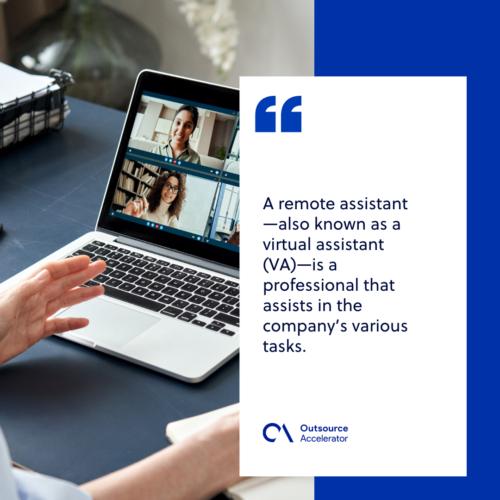Just How to Construct a Successful Group of Remote Professionals
In today's significantly digital landscape, the capability to build an effective team of remote professionals is necessary for organizations intending to thrive. Crucial element such as defining clear goals, promoting effective communication, and picking appropriate partnership devices play a critical duty in this process. It is the subtler elements-- like supporting a cohesive business society and promoting constant understanding-- that can truly set a remote group apart. Understanding exactly how to integrate these components may increase more concerns than answers, especially when thinking about the distinct difficulties that remote job presents.
Specify Clear Goals and Expectations
Often establishing clear objectives and expectations is necessary for the success of a remote group (Remote Professionals). Without these components, employee might experience complication regarding their functions, duties, and the total goals of the job. This uncertainty can cause reduced efficiency, misaligned efforts, and ultimately, project failing
To specify clear objectives, it is important to employ the clever criteria-- Certain, Quantifiable, Attainable, Relevant, and Time-bound. This approach ensures that each goal is distinct and can be successfully interacted to all employee. It is vital to line up individual purposes with the overarching vision of the organization, fostering a feeling of purpose and commitment among group members.

Foster Effective Communication

Normal check-ins and team meetings can help keep a strong communication circulation, allowing participants to share progression updates and talk about any kind of obstructions they might come across. It is also essential to identify that different individuals might have differing communication styles. Recognizing and accommodating these differences can bring about more meaningful communications and an extra natural team dynamic.
Urge group participants to articulate their concepts succinctly and to look for explanation when required. By prioritizing efficient communication, remote teams can enhance performance, enhance connections, and produce a more inclusive job setting, eventually leading to higher success in accomplishing common goals.

Utilize the Right Devices
To sustain effective interaction within a remote team, it is vital to utilize the right devices that facilitate partnership and streamline process. The selection of tools can dramatically impact efficiency, making certain that staff member remain connected and involved regardless of geographical distances.
Begin by applying project administration software program, such as Trello or Asana, to organize jobs, set due dates, and track progression. This fosters responsibility and supplies presence into each member's contributions. Furthermore, interaction systems like Slack or Microsoft Teams supply instant messaging capabilities, allowing real-time conversations and fast decision-making.
Video clip conferencing devices, such as Zoom or Google Meet, are important for face-to-face interactions, which assist develop connection and enhance partnerships amongst staff member. In addition, record sharing and storage space solutions like Google Drive or Dropbox make certain that essential data are editable and available by all employee, promoting collaboration on projects.
Incorporating these devices successfully produces an atmosphere where remote professionals can prosper. By picking the best modern technology, organizations can enhance interaction, enhance job management, and ultimately achieve their objectives a lot more efficiently.
Build a Solid Business Culture
Producing a solid business culture within a remote team is essential for cultivating interaction and commitment among staff members. A well-defined society offers a feeling of belonging and shared function, which is critical when employee are distributed throughout various places. To cultivate this culture, leaders should establish clear worths and expectations that reverberate with staff members, making sure that every person understands the mission and vision of the company.
Regular interaction is crucial in reinforcing this culture. Making use of video phone calls, group conferences, and informal have a peek at these guys check-ins can assist keep connections and promote openness. In addition, celebrating accomplishments, both small and huge, enhances a culture of acknowledgment and appreciation.
Motivating group cooperation through virtual platforms not only improves performance but likewise cultivates social relationships - Remote Professionals. Organizing online team-building tasks can better strengthen bonds among employee, making them feel a lot more incorporated right into the company
Finally, it is essential to pay attention to employee feedback and adapt as needed. By showing that their voices matter, leaders can build count on and loyalty, eventually developing a growing remote workplace where staff members really feel valued and involved.
Encourage Continuous Knowing and Advancement
A strong business culture prepares for encouraging constant knowing and advancement within a remote team. By fostering an environment that values growth, companies can encourage workers to improve their skills, adapt to new obstacles, and ultimately contribute more effectively to group goals.
To promote continuous learning, take into consideration applying routine training sessions, workshops, and webinars that align with both individual job objectives and organizational needs. Take advantage of modern technology to assist in access to e-learning platforms, making sure that resources are readily offered for remote team participants.
Urge understanding sharing by establishing mentorship programs and developing online forums for employees to trade insights and ideal methods. Recognizing and awarding staff member who proactively participate in finding out efforts enhances the value of development and inspires others to do the same.
Moreover, carrying out routine feedback sessions can assist identify skill voids and areas for enhancement, allowing for tailored growth plans. By focusing on continuous knowing and advancement, remote groups can cultivate a society of flexibility, resilience, and innovation, which are crucial for navigating the complexities these days's organization landscape.
Conclusion
Finally, the facility of a successful remote group pivots on the assimilation of clear objectives, effective communication, ideal tools, a robust firm society, and continual learning opportunities. By aligning individual contributions with organizational goals and promoting an environment of openness and collaboration, remote professionals can flourish. Remote Professionals. The implementation of these approaches not only enhances group communication yet additionally drives inspiration, inevitably bring about boosted efficiency and success in a remote functioning landscape
It is the subtler elements-- like nurturing a this hyperlink cohesive company culture and promoting continuous learning-- that can absolutely establish a remote group apart.Efficient communication is the cornerstone of a thriving remote group. continue reading this By focusing on efficient communication, remote teams can boost efficiency, enhance relationships, and create an extra comprehensive work environment, inevitably leading to higher success in accomplishing common objectives.
Producing a strong firm culture within a remote team is essential for cultivating interaction and loyalty amongst workers.In conclusion, the facility of an effective remote team pivots on the combination of clear goals, efficient communication, proper devices, a durable business society, and continual knowing opportunities.